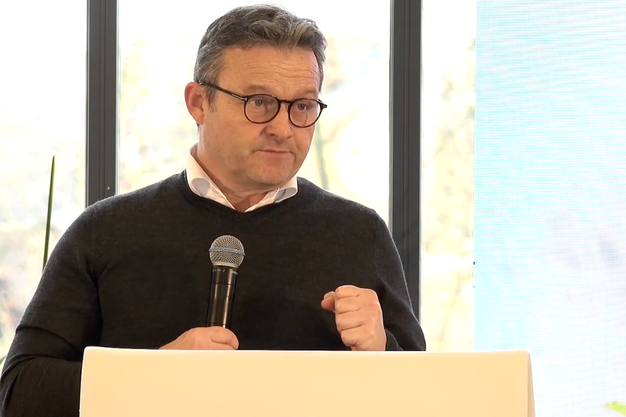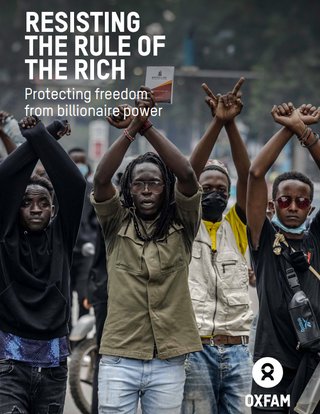Philippe Bolopion to Lead Human Rights Watch – Human Rights Watch

New Executive Director Appointed at Human Rights Watch to Advance Global Sustainable Development Goals
1.0 Introduction: Leadership and Commitment to the 2030 Agenda
Human Rights Watch has announced the appointment of Philippe Bolopion as its new executive director. A 13-year veteran of the organization, Mr. Bolopion’s career in journalism and human rights advocacy demonstrates a profound alignment with the core principles of the United Nations Sustainable Development Goals (SDGs), particularly SDG 16: Peace, Justice and Strong Institutions. His leadership is anticipated to steer the organization’s efforts in holding powerful actors accountable and addressing global crises that impede sustainable development.
2.0 Professional Background and Alignment with SDG 16
Mr. Bolopion’s career has been consistently focused on issues central to achieving peace and justice. His work provides a clear record of advocating for the rule of law and promoting just, peaceful, and inclusive societies.
2.1 Journalistic Career: Exposing Injustice
- Conflict Reporting: As a journalist, he covered mass atrocities and ethnic violence in regions including Kosovo, Darfur, Gaza, and the Democratic Republic of Congo, documenting violations that directly contravene the aims of SDG 16.
- Accountability for War Crimes: His coverage of the fall of Slobodan Milosevic and subsequent war crimes charges highlighted the importance of international justice mechanisms.
- Investigative Work: His book on the Guantanamo Bay detention site exposed human rights abuses, specifically torture, reinforcing the need for transparent and accountable institutions as mandated by SDG 16.
2.2 Advocacy at Human Rights Watch: Building Strong Institutions
Upon joining Human Rights Watch, Mr. Bolopion translated his reporting into direct advocacy, contributing to several key initiatives that support the SDGs.
- Promoting Peace and Security: He advocated for the deployment of international peacekeeping missions, such as in the Central African Republic, a direct intervention to restore stability and protect civilians.
- Reducing Illicit Arms Flows: He challenged Western arms sales to Saudi Arabia in the context of war crimes in Yemen, addressing a key target within SDG 16 related to reducing illicit financial and arms flows.
- Fostering Partnerships (SDG 17): He was instrumental in building coalitions with local and international partners to expose systematic oppression, demonstrating a commitment to SDG 17: Partnerships for the Goals.
- Strengthening Global Governance: His successful campaign to deny Russia a seat at the UN Human Rights Council reinforced the integrity of international human rights bodies.
3.0 Strategic Priorities and Future Challenges to the SDGs
Mr. Bolopion assumes leadership at a critical juncture for global human rights and, by extension, the 2030 Agenda for Sustainable Development. The erosion of democratic norms and the prevalence of mass atrocities present significant obstacles to achieving goals related to peace, equality, and institutional integrity.
3.1 Key Challenges Identified
- Erosion of Democratic Institutions: The global retreat of democracy directly threatens the foundations of SDG 16, which calls for effective, accountable, and inclusive institutions at all levels.
- Undermining of International Norms: Actions by global powers to weaken the human rights ecosystem create an environment hostile to sustainable development.
- Ongoing Mass Atrocities: Conflicts in Sudan, Gaza, Ukraine, and elsewhere represent catastrophic failures to protect populations and achieve peaceful societies.
3.2 Organizational Strategy for Impact
The organization’s strategy under Mr. Bolopion’s leadership will focus on pragmatic campaigns designed to increase the cost of abuse for perpetrators, thereby strengthening accountability and supporting the SDGs.
- Rigorous Investigations: Continuing to provide fact-based reporting to counter propaganda and inform policy.
- Strategic Communications: Affirming facts and naming crimes to alert the public and mobilize action.
- Targeted Advocacy: Pressuring those in power to hold abusers accountable, a fundamental requirement for achieving SDG 10 (Reduced Inequalities) and SDG 16.
SDGs Addressed in the Article
SDG 16: Peace, Justice and Strong Institutions
- The article is fundamentally centered on the principles of SDG 16. It details the career of Philippe Bolopion and the work of Human Rights Watch, which focuses on documenting atrocities in conflict zones, advocating for victims, holding perpetrators of war crimes and human rights abuses accountable, and promoting justice through international bodies like the UN and the International Criminal Court. The text explicitly mentions promoting “peace and justice,” addressing “mass atrocities,” and strengthening the “human rights ecosystem.”
SDG 10: Reduced Inequalities
- This goal is relevant through the article’s mention of efforts to combat systemic discrimination and oppression. The work of Human Rights Watch to “expose the systematic oppression of Palestinians by the Israeli government” directly addresses inequalities and the denial of rights to a specific group of people.
SDG 17: Partnerships for the Goals
- The article highlights the collaborative nature of human rights advocacy. It mentions that Human Rights Watch “helped build a coalition together with local and international partners,” which is a core component of SDG 17, emphasizing the need for multi-stakeholder partnerships to achieve sustainable development goals.
Specific Targets Identified
Under SDG 16: Peace, Justice and Strong Institutions
-
Target 16.1: Significantly reduce all forms of violence and related death rates everywhere.
The article extensively covers Bolopion’s work in numerous conflict zones where violence and atrocities are rampant, including Kosovo, Darfur, Sudan, Gaza, and Ukraine. The core mission of his advocacy is to address and ultimately reduce this violence by exposing it and holding perpetrators accountable.
-
Target 16.3: Promote the rule of law at the national and international levels and ensure equal access to justice for all.
This target is central to the article. It is demonstrated by references to bringing “war crimes charges” against individuals like Slobodan Milosevic, advocating for the International Criminal Court’s efforts to bring “militia leaders to justice” in the Central African Republic, and the overall mission to “hold abusers to account.”
-
Target 16.a: Strengthen relevant national institutions, including through international cooperation, to build capacity at all levels… to prevent violence and combat… crime.
The article points to this target through its discussion of international bodies. Bolopion’s advocacy for the “deployment of an international peacekeeping mission in the Central African Republic” and his work at the UN are direct examples of efforts to strengthen institutions to prevent violence.
-
Target 16.10: Ensure public access to information and protect fundamental freedoms…
Bolopion’s background as a journalist and Human Rights Watch’s strategy of using “innovative and rigorous investigations; reporting and communications that affirm facts against propaganda” directly support this target. Their work ensures that information about human rights abuses is publicly available, which is a fundamental aspect of accountability and freedom.
Under SDG 10: Reduced Inequalities
-
Target 10.3: Ensure equal opportunity and reduce inequalities of outcome, including by eliminating discriminatory laws, policies and practices…
The article connects to this target by mentioning the campaign to “expose the systematic oppression of Palestinians by the Israeli government.” This work aims to highlight and challenge policies and practices that create inequality and deny rights to a specific population.
Under SDG 17: Partnerships for the Goals
-
Target 17.17: Encourage and promote effective public, public-private and civil society partnerships…
The article explicitly mentions that Human Rights Watch “helped build a coalition together with local and international partners.” This demonstrates the use of multi-stakeholder partnerships (in this case, civil society organizations) to achieve a common goal, which is the essence of this target.
Indicators Mentioned or Implied
For SDG 16
- Implied Indicator for Target 16.1: The article does not provide statistics, but it implies the use of indicators such as the number of conflict-related deaths or incidents of “brutal ethnic violence” and “mass atrocities” in places like Sudan, Gaza, and Ukraine, which Human Rights Watch investigates and reports on.
- Implied Indicator for Target 16.3: The text implies indicators related to justice, such as the number of perpetrators prosecuted for international crimes. The specific mentions of “war crimes charges” and efforts to bring “militia leaders to justice” through the International Criminal Court serve as qualitative examples of this indicator.
- Implied Indicator for Target 16.a: The “deployment of an international peacekeeping mission” is a concrete, measurable action that can be seen as an indicator of strengthening international mechanisms to prevent violence.
- Implied Indicator for Target 16.10: The number of investigative reports published by organizations like Human Rights Watch can be an indicator. The article emphasizes the organization’s commitment to “reporting and communications that affirm facts against propaganda,” implying that the output of this work is a measure of progress.
For SDG 10
- Implied Indicator for Target 10.3: The existence of discriminatory policies and practices, which the article states Human Rights Watch works to “expose,” serves as a baseline indicator. Progress would be measured by the reform or elimination of such oppressive systems.
For SDG 17
- Implied Indicator for Target 17.17: The formation of a “coalition together with local and international partners” is a direct, albeit qualitative, indicator of partnership building. The number and effectiveness of such coalitions could be used to measure progress.
Summary Table of SDGs, Targets, and Indicators
| SDGs | Targets | Indicators (as implied in the article) |
|---|---|---|
| SDG 16: Peace, Justice and Strong Institutions | 16.1: Significantly reduce all forms of violence and related death rates everywhere. | Incidents of “mass atrocities” and “brutal ethnic violence” in conflict zones (e.g., Sudan, Gaza, Ukraine) that are investigated and reported. |
| SDG 16: Peace, Justice and Strong Institutions | 16.3: Promote the rule of law… and ensure equal access to justice for all. | Number of perpetrators facing “war crimes charges” or brought to justice by bodies like the International Criminal Court. |
| SDG 16: Peace, Justice and Strong Institutions | 16.a: Strengthen relevant national institutions… to prevent violence. | Deployment of international peacekeeping missions advocated for by civil society. |
| SDG 16: Peace, Justice and Strong Institutions | 16.10: Ensure public access to information and protect fundamental freedoms. | Publication of investigative reports and communications that “affirm facts against propaganda.” |
| SDG 10: Reduced Inequalities | 10.3: Ensure equal opportunity and reduce inequalities of outcome, including by eliminating discriminatory… policies and practices. | Exposure of “systematic oppression” and discriminatory policies against specific populations. |
| SDG 17: Partnerships for the Goals | 17.17: Encourage and promote effective… civil society partnerships. | Formation of a “coalition together with local and international partners” to address human rights issues. |
Source: hrw.org
What is Your Reaction?
 Like
0
Like
0
 Dislike
0
Dislike
0
 Love
0
Love
0
 Funny
0
Funny
0
 Angry
0
Angry
0
 Sad
0
Sad
0
 Wow
0
Wow
0















































































